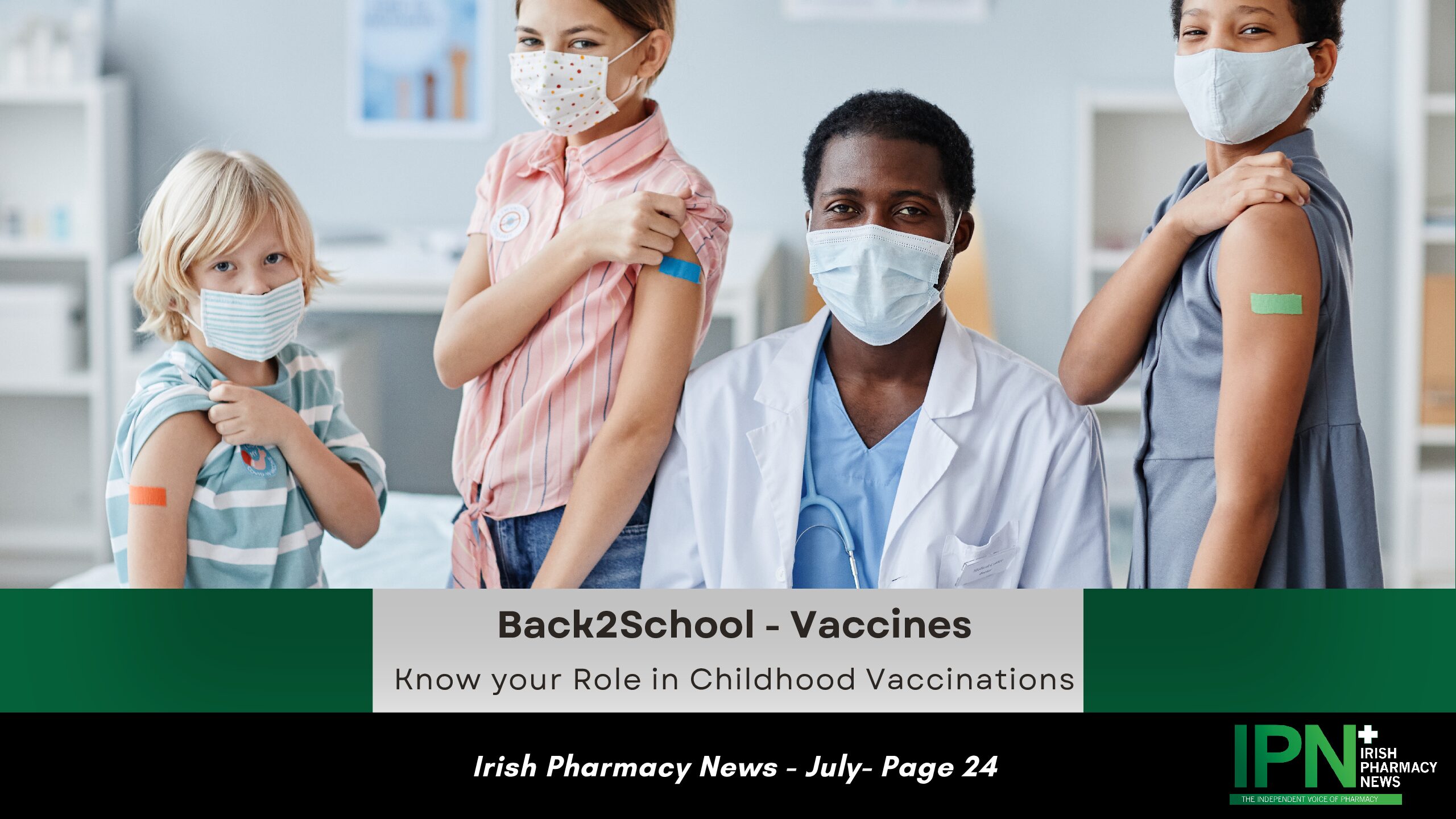Know your Role in Childhood Vaccinations
The role of pharmacists in immunisation and vaccination varies across the world; in some countries pharmacists are primarily involved in ensuring the safe supply and dispensing of vaccines, as well as advocating for immunisation, while in other countries they are empowered to play a more active role, as they are legally authorised organise vaccinations activities and campaigns.
It is estimated that ten million lives per year could be saved by increasing access to medicines and vaccinations. Community pharmacists are therefore in a strong position to provide a major contribution to public health due to their accessibility, distribution and available medicines expertise.
Vaccinations being Offered:
During the school year
• Children in Junior Infants will be offered 4 in 1 and MMR vaccines
• Students in first year of secondary school will be offered HPV, Tdap and MenACWY
These vaccines are also available to students who are in special schools or are home schooled in the same age group.
Meningococcal Disease
Meningococcal disease is caused by infection with Neisseria meningitidis and presents as bacterial meningitis (15 per cent of cases), septicaemia (25 per cent of cases), or a combination of the two. It is the leading infective cause of death in early childhood.
There are several strains or ‘groups’ of meningococcal bacteria (A, B, C, W, X and Y). In the past 50 years, most meningococcal disease in the UK and Ireland has been due to group B (MenB) and group C (MenC), although the MenC vaccine introduced in 1999 has now successfully reduced cases to just a handful each year. Currently MenB accounts for the vast majority of meningococcal disease although we have recently seen an alarming rise in a particularly deadly strain of meningococcal W meningitis and septicaemia.
There are five main groups that commonly cause disease – MenA, MenB, MenC, MenW, MenY.
MenB causes the majority of the disease.
How it is caused:
• Around 10% of the population carries meningococcal bacteria in the back of their throats at any given time. This is usually healthy carriage and helps develop immunity
• Occasionally the bacteria defeat the body’s defences and cause infection
• The bacteria are passed from person to person by coughing, sneezing and intimate kissing
• The bacteria break through the lining at the back of the throat and pass into the bloodstream
• They can travel in the bloodstream to infect the meninges, causing meningitis, or while in the bloodstream they can cause septicaemia
From September 2021, secondary school children in first-year are offered a meningococcal ACWY booster vaccination.
The Meningococcal ACWY vaccine will boost children’s protection against group C meningococcal disease. It will also provide additional protection against meningococcal groups A, W and Y. In addition, this vaccine also reduces the risk of carrying the disease so can help protect other people too.
MenACWY being used in Ireland is Nimenrix. This is a conjugate vaccine containing Group A, C, W and Y polysaccharides conjugated to tetanus toxoid carrier protein. The vaccine protects against N. meningitidis Groups A, C, W and Y invasive disease.
Since 2015 more cases of invasive meningococcal serogroups W and Y disease have been seen in Ireland. Prior to 2015 the annual number of both serogroups was low. Between 1999 and 2014 there was an average of two cases for both serogroups reported per year.
Between 2015 and 2018, a total of 36 serogroup W and 20 serogroup Y cases were reported, giving an average annual notification rate 9 cases per year of serogroup W and for 5 cases per year of serogroup Y.
In view of the emergence of meningococcal serogroups W and Y, the National Immunisation Advisory Committee (NIAC) recommended that one dose of MenACWY vaccine should be given to all students in 1st year of second level education replacing the MenC vaccine in 2019.
Meningococcal disease can start very suddenly. Symptoms include fever, stiff neck, headache, joint pains and a rash.
Meningococcal disease can occur at any age, but the highest rate occurs in children under 5 years of age, especially children under 1 year old. The next high-risk group are young people aged 15-19 years.
Importantly for community pharmacists to be aware, they might have school children and/ or their parents presenting to the pharmacy with associated after effects. Some students can have an area of soreness, swelling and redness in their arm where the injection was given. This usually passes after a day or two.
Some students may get a headache, feel sick in their tummy or run a slight temperature. If this happens, paracetamol or ibuprofen will help.
HPV vaccinations for girls and boys
The HPV vaccine has been offered to girls in their first year of secondary school since 2010. This is because the most common cancer caused by the HPV virus is cervical cancer which only affects women.
Since September 2019, boys have also been offered the HPV vaccine. This is because HPV can cause cancers and genital warts in boys too.
Conditions caused by HPV infection
In girls, HPV infection can cause cancer of the:
• cervix
• vulva (the area surrounding the opening of the vagina)
• vagina
• anus
• oropharynx (part of the throat at the back of the mouth)
In boys, HPV infection can cause cancer of the:
• anus
• oropharynx (part of the throat at the back of the mouth)
• penis
HPV infection can also cause genital warts in both girls and boys.
Read July IPN
Read our latest Features









